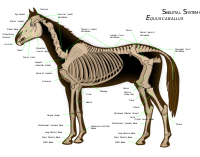
Photo from wikipedia
BACKGROUND This study assessed the surgical outcomes of Lisfranc injuries accompanied by multiple metatarsal fractures. Metatarsal fractures here refers to metatarsal head, neck, and shaft (including shaft fractures accompanied by… Click to show full abstract
BACKGROUND This study assessed the surgical outcomes of Lisfranc injuries accompanied by multiple metatarsal fractures. Metatarsal fractures here refers to metatarsal head, neck, and shaft (including shaft fractures accompanied by fractures of the base) fractures, as well as mixed (i.e., segmental fracture) fractures, as seen on imaging studies. METHODS Between 2002 and 2015, one hundred and seventy-six patients were followed-up for a mean of 92 months, including eight patients who underwent secondary arthrodesis due to severe arthritis after ORIF. All the patients underwent surgical fusion (primary partial arthrodesis, PPA; n = 78) or non-fusion (percutaneous or open reduction and internal fixation, ORIF; n = 98) procedures and the outcomes were evaluated by clinical examinations, radiography, visual analogue scale (VAS) pain score, the American Orthopaedic Foot and Ankle Society (AOFAS) midfoot score, the Foot and Ankle Outcome Score (FAOS), and the Short Form (SF)-36 physical and SF-36 mental questionnaires. The parameters between the fusion and non-fusion groups were analyzed by repeated-measures ANOVA. Statistically significant differences between the two groups were then further analyzed using a two-independent-samples t-test. RESULTS Anatomical reduction was achieved in 161 patients. At the last follow-up, the mean AOFAS score was 74.67 (range: 39-91) in the non-fusion group and 82.79 (range: 67-97) in the fusion group (P = 0.003). The PPA and ORIF groups differed significantly with respect to the VAS pain score (1.93 vs. 1.21), the SF-36 physical (75.87 vs. 80.90) and mental (75.76 vs. 81.33) components, and the FAOS pain (72.74 vs. 84.06), symptoms (71.87 vs. 82.49), activities of daily life (ADLs: 73.12 vs. 81.54), sport/recreation (sport/rec: 57.99 vs. 73.23), and quality of life (QoL: 79.95 vs. 86.67) components. In the ORIF group, 23 patients had mild/moderate post-traumatic osteoarthritis. CONCLUSIONS With longer and more conservative postoperative management, fusion results in a better outcome than non-fusion in the treatment of Lisfranc injuries accompanied by multiple metatarsal fractures.
Journal Title: Injury
Year Published: 2019
Link to full text (if available)
Share on Social Media: Sign Up to like & get
recommendations!